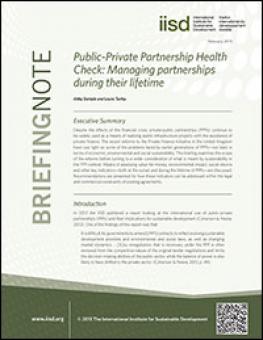
Public-Private Partnership Health Check: Managing partnerships during their lifetime
Despite the effects of the financial crisis, public-private partnerships (PPPs) continue to be widely used as a means of realizing public infrastructure projects with the assistance of private finance.
The recent reforms to the Private Finance Initiative in the United Kingdom have cast light on some of the problems faced by earlier generations of PPPs—not least in terms of economic, environmental and social sustainability. This briefing examines the scope of the reforms before turning to a wider consideration of what is meant by sustainability in the PPP context. Means of assessing value-for-money, environmental impact, social returns and other key indicators—both at the outset and during the lifetime of PPPs—are discussed. Recommendations are presented for how these indicators can be addressed within the legal and commercial constraints of existing agreements.
You might also be interested in
Green Public Procurement in India
This report analyzes the status of green public procurement (GPP) in India and suggests key strategies for advancing sustainable procurement practices.
The Role of Multilateral Development Banks for Low-Carbon Procurement in the Infrastructure Sector
This report examines the critical role of multilateral development banks (MDBs) in advancing low-carbon procurement within the infrastructure sector.
Green Public Procurement in Indonesia
This report explores the state of green public procurement (GPP) in Indonesia and offers key strategies for advancing sustainable procurement practices.
Monitoring Progress in Green Public Procurement
This report outlines the importance of monitoring progress in green public procurement (GPP) and highlights various methodologies, challenges, and recommendations.